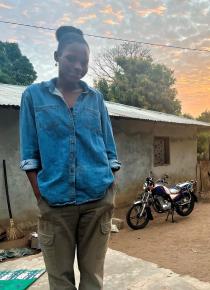Abbie Jobe

Meet Abbie Jobe
Hometown: Bronx, NY
College: Agriculture and Life Sciences
Major: Agriculture Science
Year: 2026
Abbie Jobe is a Sophomore in the College of Agriculture and Life Sciences, pursuing a major in Agriculture Science. During the 2022-23 academic year, Abbie was awarded the Frank H.T. Rhodes Tradition Endowment to cover the costs of a winter service trip to The Gambia, to volunteer with the Nitte Foundation, an organization with a focus on a movement to end educational inequity. Below, Abbie shares the values of service learning and developing connections with a community in a way that she never had before.
Prior to this experience, I had only traveled to The Gambia once, so by volunteering to educate Gambian students using Montessori practices, I was also able to learn more about my own Gambian identity. While in The Gambia, I partook in Montessori training in the urban region of Kombo and I implemented these practices in the community of Foni, located in the rural region upcountry.
During my time in Foni, I would observe how the other Montessori teachers with more years of training would use the natural resources available to them to teach the young children in the community. Montessori training goes against the social norms in The Gambia as education and learning are tied to abuse. If a child does not understand the content of an academic subject, it is likely they would face physical punishment from their teachers. The misunderstanding is that the child is distracted and does not take their education seriously. Therefore, to make them learn, it is best they fear they will be punished by their teachers. This is the way my siblings, parents, and grandparents have been educated. The introduction of Montessori learning disrupts the social norms that do not consider the difference in children's learning preferences.
Academic materials are resources not readily available to the teachers and students in the Foni region. I searched for arts and crafts materials within the community to incorporate in learning activities in Foni and Kombo. I am still working with the schools to try to find ways of incorporating more arts and crafts into the curriculum; drawing inspiration from the traditional craft tools used in The Gambia such as weaving. Implementing arts and crafts into the curriculum is also a goal intended to reform the education system in The Gambia through Montessori teaching practices.
I love this practical allocation of resources because often children in Africa are given resources or materials to better their life. But if it is continuously imported, how will these young individuals ever become independent and self-reliant? Making children use the resources in their community not only increases investments in other local Gambian markets but will hopefully inspire them to see a future for themselves in the country.
There has been a mass migration of Gambians who have left the country in search of better opportunities which has caused a generational tradition of having Gambian families rely on remittances from family members abroad. This has caused the small country to become one very interconnected community where everyone depends on someone else. This is great but it has caused many young people to see no future for themselves in the country because all they have seen are people striving to leave the country and resources imported. Montessori training teaches young children not only about traditional academic subjects, but it increases the value they associate with being from such a beautiful country. In light of this experience, I will forever be dedicated to service that promotes the independence of individuals in the countries I serve.
In the future, I am hopeful to return to The Gambia so I can be able to continue doing service in the Global South. Since arriving to Cornell, my confidence in myself has grown so much that I have begun to make my dreams a reality. Being a Tradition Scholar provided me with an opportunity that only further increased my confidence in my plans of integrating my passion for service and STEM. This semester I am taking the first-year environmental engineering courses in an attempt to switch to the environmental engineering major in CALS.
I am also on Cornell’s Engineers in Action project team where this summer we will be traveling to the Kingdom of Eswatini (formerly Swaziland) to build a bridge in the rural community. This bridge will help individuals in the community have better access to resources that are located on the other side of a floodplain. On this team, I have been chosen to be the Cultural Relations Manager to aid in fostering community between the Eswatini community members and Cornell students. I am committed to using my technical skills to serve people in any way necessary. I only hope that my time at Cornell will prepare me to do so entirely as I truly believe it is my fate. I would like to say “thank you” to the Cornell Tradition for choosing me as a Fellow.
